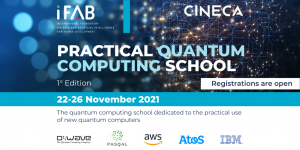Practical Quantum Computing School

- Questo evento è passato.
Practical Quantum Computing School
22/11/2021 @ 09:30 - 26/11/2021 @ 17:00
CINECA/IFAB Practical Quantum Computing School
1° edition Online – Registrazione necessaria
La scuola di quantum computing sviluppata da IFAB e CINECA dedicata all’uso pratico dei nuovi computer quantistici con la partecipazione di D-Wave, Pasqal, Amazon Web Services, ATOS e IBM.
CINECA e IFAB sono lieti di presentare la prima edizione della “Practical Quantum Computing School”, la scuola di computazione quantistica dedicata all’uso pratico dei nuovi computer quantistici.
Grazie alla “Practical Quantum Computing School”, gli studenti impareranno direttamente dagli sviluppatori come utilizzare i più famosi strumenti di Quantum Computing disponibili sul mercato.
La scuola è stata creata per istruire la comunità scientifica (e non scientifica) ad utilizzare le piattaforme più importanti per l’accesso agli attuali computer quantistici ed emulatori quantistici.
Essendo una scuola basata principalmente sull’uso pratico delle risorse di quantum computation, per partecipare e sfruttare appieno tutti i contenuti proposti sarà necessario avere una conoscenza minima di Quantum Computing (compresi gli argomenti di Quantum Annealing). Queste informazioni possono essere trovate in qualsiasi corso di Introduzione all’informatica quantistica.
In questa prima edizione avremo l’opportunità di imparare ad utilizzare i software di D-Wave, Pasqal, Amazon Web Services, ATOS e IBM.
Le lezioni saranno tenute in lingua Inglese
Registrati ora
SCHOOL AGENDA
22/11/2021 – D-Wave
TIMETABLE: 09:30 –12:00 13:00 – 16:00
D-Wave’s mission is to unlock the power of quantum computing for the world. In this workshop, we will introduce you to our quantum computers and suite of software tools that are available through the Leap cloud platform. Using the Ocean Software Development Kit, a Python programming package, together we will build quadratic models for real optimization problems that can run on both our hybrid solvers and quantum annealers. To conclude, we’ll showcase some real-world customer applications. This hands-on workshop will require participants to have an active Leap account, which can be created for free at cloud.dwavesys.com/leap.
23/11/2021 – Pasqal: Pulse-level Programming of Neutral-Atom Devices with Pulser
TIMETABLE: 09:30- 17:00
Programmable arrays of Rydberg neutral atoms are rising in notoriety thanks to recent successes in controlling and showcasing remarkable phenomena in many-body quantum physics. They are entering a more mature stage in which hundreds of atoms can be prepared and acted upon by laser pulses. In addition, the development of high-fidelity quantum gates is making them promising architectures for quantum computation. In this course we present Pulser, an open-source Python library for programming neutral-atom devices at the pulse level. Pulser provides a user-friendly environment for the design of pulse sequences in close contact with the hardware, along with simulation routines for studying and exploring their outcomes for small systems. It is a versatile framework for the design of quantum protocols in general, supporting the implementation of both quantum circuits and analog procedures. We will introduce – with a series of walk-through code examples – how to construct the basic blocks of a sequence tailored to run on a real device. Then, we present how to put together and explore several interesting applications that have been the focus of recent research: the construction of a controlled-Z gate for digital quantum computation, which exploits the Rydberg Blockade mechanism, the preparation of an antiferromagnetic state in a 2D grid of atoms by adiabatically varying the parameters of an Ising Hamiltonian, and the solution of the Maximal Independent Set combinatorial problem, which is naturally embeddable into the Rydberg atom arrays.
24/11/2021 – Amazon Web Services: Amazon Braket: an integrated software development environment for quantum computing in the cloud
TIMETABLE: 09:30-17:00
Amazon Braket is a fully managed quantum computing service that helps you get started with quantum computing and accelerate your research using cloud resources on Amazon Web Services (AWS). Amazon Braket integrates in a single development environment everything you need to build, test and run quantum algorithms. It has been designed to be technology agnostic, removing the need to code against quantum programming environments, which commonly exist for different quantum computers. It includes a unified development platform, a choice of classical circuit simulators, and access to different types of quantum processing units (QPU) from several hardware providers (D-Wave, IonQ and Rigetti). With the Amazon Braket, you can build quantum algorithms, then test and run them on different quantum computers and simulators by changing a single line of code. In this hands-on workshop we will introduce Amazon Braket and how this is integrated with other AWS cloud services. We will demonstrate how to develop and test your algorithms against the high-performance simulators and access the QPU for running your first cloud quantum computing program.
Agenda:
9:30 – 10:00 – Introduction to Amazon Braket
10:00 – 10:30 – Walk through the AWS Cloud Console
10:30 – 11:00 – Virtual Coffee Break and Chat
11:00 – 12:30 – Getting started with Managed Notebooks
12:30 – 13:30 – Lunch Break
13:30 – 14:15 – Using Amazon Braket SDK in local development environment
14:15 – 15:00 – Demonstration of Hybrid Classical/Quantum Algorithms. Use case: VQE
15:00 – 15:30 – Virtual Coffee Break and Chat
15:30 – 16:15 – Demonstration of Hybrid Classical/Quantum Algorithms. Use case: QML
16:15 – 17:00 – Closing with Quantum Randomness
25/11/2021 – ATOS
TIMETABLE: 09:30-17:00
9.30- 11:00 : Atos Quantum Program and MyQLM Hands on Demo Session + Q&A – Ingmar D’Amato & Xavier Geoffret
11-11:15: Break
11:15 – 11:45: Atos Quantum Simulated Annealing Environment: QLM for Combinatorial Optimization + Q&A– Sabine Keravel
LUNCH BREAK
14:00 – 14:50 : Max – Cut Hands-on demo on QLM (Digital & Analog approach) + Q&A
14:50 – 15: Break
15 – 15:30: Q-Score, the Atos free quantum Benchmarking standard for Quantum Processors + Q&A
END
26/11/2021 – IBM
TIMETABLE: 9.30-17.00
During this lesson participants will program quantum computers using Qiskit opensource framework (Quantum Information Software Kit).
Participants will learn how to use the programming graphic tool Circuit Composer and Qiskit packages for Python by sending their programs via cloud to real quantum computers made available on the IBM Quantum platform.
Finally, participants will be shown how it is possible to perform some quantum algorithms known in the literature.
AGENDA:
- 9:30 – Introduction on IBM Quantum
- 10:30 – Hands-on session on IBM Quantum Composer: a graphical quantum programming tool that lets you drag and drop operations to build quantum circuits and run them on real quantum hardware or simulators.
- 12:30 – Lunch break.
- 13:30 – Hands-on session on QISKIT: an open-source SDK for working with quantum computers at the level of pulses, circuits, and application modules.
- 14:30 – Deep dive into quantum algorithms using Python on Jupyter Notebook.
- 16:30 – Closing

